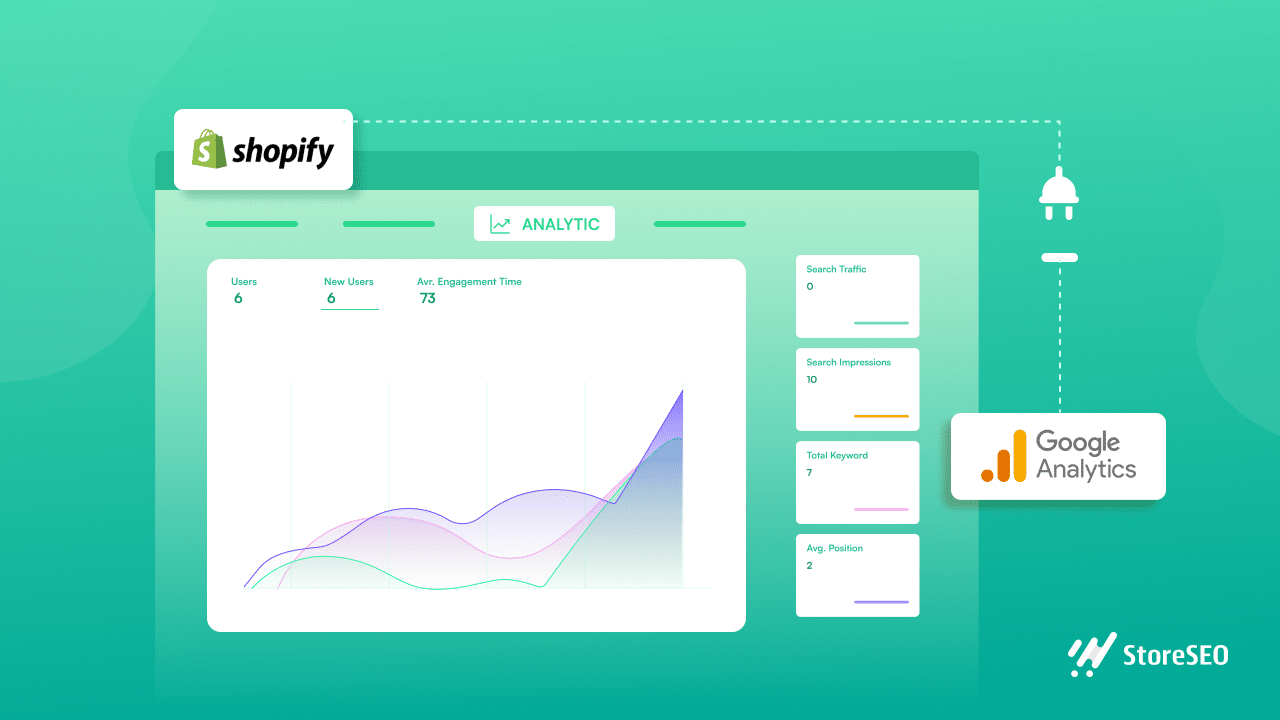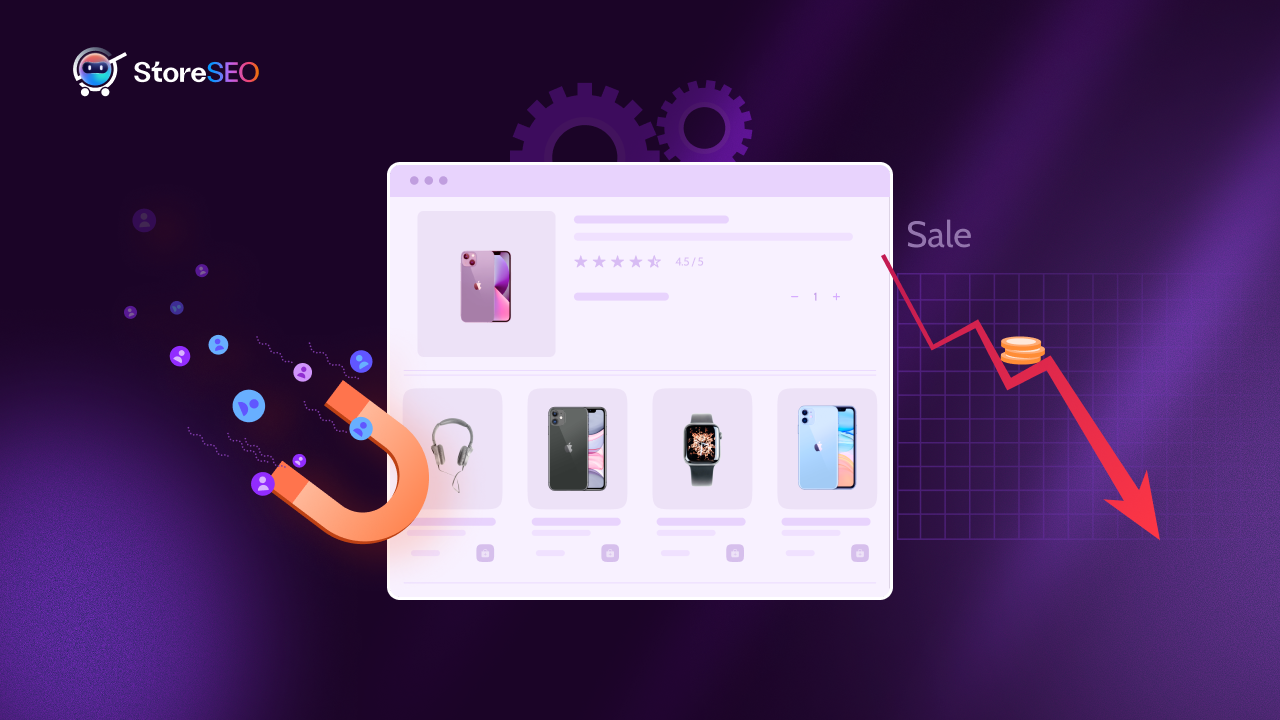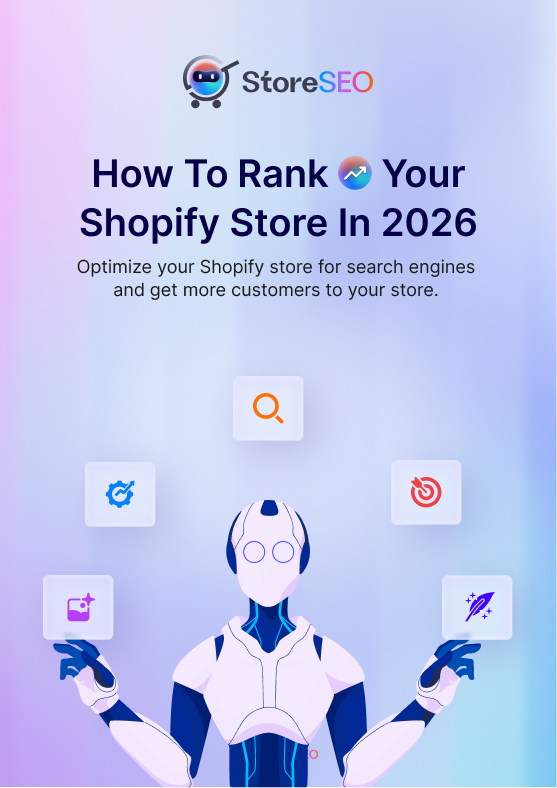Google Analytics est un outil puissant et gratuit qui fournit une multitude d'informations sur les visiteurs de votre site Web et leurs interactions. Lorsque vous vous connectez De Google Analytics à Shopify magasin, vous avez accès à un trésor de données pour vous aider à prendre des décisions éclairées, à affiner vos stratégies marketing et en fin de compte, augmentez vos ventes.
Et avec notre plus récent, nous présentons notre dernier ajout : l'intégration transparente des fonctionnalités de Google Analytics dans notre Référencement de magasin Plateforme. Bienvenue dans un monde où votre présence en ligne est renforcée par des informations de pointe, vous permettant de prendre des décisions éclairées qui mènent au succès.

Présentation de la dernière fonctionnalité de StoreSEO : intégration de Google Analytics à la boutique Shopify
StoreSEO PRO offre une fonctionnalité incroyable qui permet une intégration transparente entre StoreSEO et Google Analytics. Cette intégration vous permet de surveiller le trafic de votre boutique et d'obtenir des informations sur la façon dont les visiteurs découvrent et interagissent avec votre boutique en ligne, ce qui peut être un excellent moyen de comprendre quelle partie de votre boutique vous devez améliorer et comment.
Connecter Google Analytics à StoreSEO ne prend que quelques clics et nous sommes là pour vous apporter le guide complet pour vous aider à démarrer beaucoup plus rapidement et plus facilement.
Note: Avant de commencer, assurez-vous d'avoir mis à niveau vers n'importe quel StoreSEO Premium prévoyez de connecter votre boutique Shopify à Google Analytics. De plus, avant de suivre cette directive, assurez-vous d'avoir configuré un Google Analytics compte car il est nécessaire de le lier à StoreSEO.
Pour commencer, accédez à votre tableau de bord et sélectionnez l'option «Paramètres' onglet, puis accédez à 'Intégrations Google'. Ensuite, authentifiez votre boutique auprès de Google en cliquant sur le bouton «Connectez-vous maintenant' bouton.

Sélectionnez le compte Google associé à votre compte Google Analytics dans la fenêtre suivante pour le connecter à votre boutique. Une fois connecté, le processus d'authentification sera terminé instantanément.

Ensuite, cliquez sur le bouton «Vérifiez maintenant" pour confirmer le site Web de votre boutique Shopify.

Une fenêtre s'affichera vous invitant à vous reconnecter à votre compte Gmail. Une fois connecté, la vérification de votre boutique sera terminée.

Une fois que vous avez vérifié votre site avec Google, cliquez sur le bouton «Lien maintenant" pour connecter StoreSEO à Google Search Console. Ensuite, attendez patiemment que la fenêtre suivante apparaisse.

Une fenêtre s'ouvre et vous devrez vous reconnecter à votre compte Gmail. Une fois connecté, cliquez sur le bouton « Autoriser » pour continuer.

Sélectionnez le 'Permis maintenant" pour envoyer le plan du site de votre boutique Shopify à Google. En cliquant sur ce bouton, le plan du site de votre boutique sera rapidement envoyé à Google.

Une autre fenêtre s'ouvre et vous devrez vous reconnecter à votre compte Gmail. Une fois connecté, le plan de site de votre boutique sera automatiquement envoyé à Google.

Ensuite, sélectionnez le «Autoriser maintenant' pour accorder les autorisations requises pour l'indexation instantanée de votre boutique.

Une autre fenêtre s'ouvre et vous devrez vous reconnecter à votre compte Gmail. Une fois connecté, cliquez sur le bouton «Permettre" pour continuer.

Ensuite, vous serez redirigé vers votre boutique. Maintenant, cliquez simplement sur le bouton «OUI' dans la fenêtre contextuelle pour lancer l'indexation immédiate de vos produits.
De même, sélectionnez le «Accorder l'accès' bouton pour autoriser l'accès et fournir les autorisations nécessaires aux données Google Analytics.

Ensuite, saisissez votre identifiant de propriété Google Analytics GA4 et cliquez sur le bouton « Mettre à jour » pour configurer les analyses pour votre boutique.
Remarque : reportez-vous à la documentation fournie pour localiser votre identifiant de propriété Google Analytics GA4.

Une fois les étapes ci-dessus terminées, cliquez sur le bouton « Analytics » pour surveiller les données utilisateur de votre boutique Shopify. Cela démontre l'intégration transparente de StoreSEO avec Google Analytics pour votre boutique Shopify.
Remarque : Google peut prendre jusqu'à 24 heures pour signaler les données d'analyse une fois la configuration finalisée.

Comprendre comment l'intégration de Google Analytics à la boutique Shopify peut dynamiser votre entreprise
Maintenant que vous savez comment connecter votre boutique Shopify à Google Analytics en quelques clics, il est temps d'examiner en détail les raisons pour lesquelles vous devriez franchir cette étape pour développer votre activité. Plus vous en savez sur vos clients, leur comportement et les performances de votre site Web, mieux vous pourrez adapter vos efforts marketing et optimiser votre boutique en ligne. C'est là que l'intégration de Google Analytics dans la boutique Shopify peut changer la donne.
Découvrez des informations précieuses sur vos clients
La connexion de Google Analytics aux boutiques Shopify ouvre la porte à une multitude d'informations sur les clients. Vous pouvez découvrir qui sont vos visiteurs, d'où ils viennent et même obtenir des informations démographiquesCes données sont précieuses pour comprendre votre public cible et adapter vos stratégies marketing à ses préférences.
Suivre le comportement des utilisateurs
L'une des fonctionnalités les plus puissantes de Google Analytics est sa capacité à suivre le comportement des utilisateurs sur votre site Web. Vous pouvez voir quelles pages sont les plus populaires, combien de temps les visiteurs restent sur votre site et où ils abandonnent. Grâce à ces informations, vous pouvezidentifier les points sensibles de votre parcours utilisateur et apporter les améliorations nécessaires pour augmenter les conversions.

Mesurer les performances du commerce électronique
Pour les propriétaires de boutiques Shopify, le suivi des performances du commerce électronique est primordial. Google Analytics s'intègre parfaitement à Shopify, fournissant des rapports détaillés sur vos ventes, vos revenus et vos données de transaction. Vous pouvez analyser les produits qui se vendent le mieux, suivre l'efficacité des campagnes marketinget optimisez vos offres de produits.
Surveiller les sources de trafic
Il est essentiel de comprendre d'où vient le trafic de votre site Web pour un marketing efficace. Google Analytics répartit vos sources de trafic en catégories telles que la recherche organique, la recherche payante, les réseaux sociaux, etc. Ces informations vous aident à répartir judicieusement votre budget marketing et à vous concentrer sur les canaux qui génèrent le trafic le plus précieux.
Affiner les stratégies marketing
Grâce aux données collectées grâce à l'intégration de Google Analytics dans Shopify, vous pouvez affiner vos stratégies marketing. Identifiez les campagnes qui génèrent le plus de conversions, suivez le retour sur investissement de vos efforts publicitaires et prenez des décisions basées sur des données pour optimiser vos dépenses marketing.
Améliorer l'expérience utilisateur
Une expérience utilisateur fluide est essentielle pour fidéliser les visiteurs et augmenter les chances de conversion. L'intégration de Google Analytics à la boutique Shopify peut révéler les appareils et les navigateurs utilisés par vos clients, vous aidant ainsi à garantir que votre site Web est réactif et fonctionnel sur toutes les plateformes.
Que vous apporte l'intégration de Google Analytics à Shopify ?
StoreSEO PRO offre une fonctionnalité incroyable qui permet une intégration transparente avec Google Analytics, vous permettant de surveiller le trafic de votre boutique et d'obtenir des informations précieuses sur la façon dont les visiteurs découvrent et interagissent avec votre boutique en ligne.
Amélioration de l'analyse des données
L'intégration de Google Analytics avec StoreSEO offre aux clients une compréhension plus approfondie des performances de leur site Web. analyser les données des visiteurs, les clients obtiennent des informations sur le comportement des utilisateurs, notamment sur les pages les plus visitées, la durée de leur visite sur le site et les moments où ils abandonnent la navigation. Ces informations précieuses aident les clients à prendre des décisions éclairées concernant le contenu de leur site Web et l'expérience utilisateur.
Suivi des performances
Grâce à cette intégration, les clients peuvent surveiller efficacement le succès de leurs efforts marketing. Ils peuvent suivre des indicateurs clés tels que les conversions, les ventes et les revenus, ce qui leur permet d'évaluer avec précision l'impact de diverses campagnes et stratégies marketing. Cette approche basée sur les données garantit que les ressources sont allouées aux initiatives les plus réussies.
Rapports personnalisés
L'intégration permet aux clients de créer des rapports personnalisés axés sur des indicateurs clés de performance (KPI) spécifiques en rapport avec leurs objectifs commerciaux. Ces rapports personnalisés aident les clients à garder un œil attentif sur les indicateurs qui comptent le plus pour eux, simplifiant ainsi leur processus de prise de décision.
Stratégie SEO améliorée
En alignant les efforts de référencement sur les données réelles d'engagement des utilisateurs de Google Analytics, les clients peuvent affiner leurs stratégies de référencement. Ils peuvent identifier des opportunités pour optimisation des mots clés et des améliorations de contenu, augmentant ainsi la visibilité de leur site Web dans les moteurs de recherche.
Libérez la puissance des données : connectez Google Analytics à Shopify en toute transparence
Maintenant que vous avez une idée claire de la provenance de votre trafic et de la manière dont les utilisateurs interagissent avec votre site, vous pouvez affiner vos stratégies marketing. Affectez judicieusement votre budget aux canaux qui génèrent le trafic le plus intéressant et optimisez vos campagnes pour de meilleurs résultats.
Ce blog vous a-t-il été utile ? Partagez vos réflexions et abonnez-vous à nos blogs pour des blogs plus perspicaces sur le référencement Shopify et contactez-nous sur Facebook.







